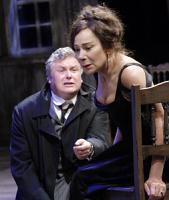The Cherry Orchard Review 2011
Premièred in 1904, this is the last play written by Anton Chekhov, who died in the same year. 'The Cherry Orchard' is essentially a comedy, though there are tragic elements, particularly in the ending.
Two issues will cause some controversy about this new version of Chekhov's most frequently produced work. First, this is described not as a translation, but a version. So you can expect some 'liberties' being taken with Chekhov's dialogue. Second, Bunny Christie's set, though impressively detailed and substantial, is more distressed cowshed than a grand, yet faded, aristocratic manor house. I suspect these two matters will be the subject of considerable debate. But neither of these items mattered much to me because the approach is faithful to Chekhov's intentions - the production focuses, for the most part, on comedy. And the updating of some of the language, though it grates with the historical setting to some extent, isn't so distracting that it diminishes the quality or power of the play.
When Madame Ranyevskaya returns from Paris to her country estate in the Russian provinces, she's informed that her home and land are to be auctioned to pay off the outstanding mortgage interest. A businessman, Lopakhin, sees a way to avoid the impending ruin. He suggests that the land with its accompanying cherry orchard, be split up into smaller units and sold as holiday homes. Though the resulting income would keep Madame Ranyevskaya in the manner she has become accustomed to, she refuses to do anything about the proposal, apart from asking for money from an old aunt. The auction takes place and the estate is duly sold.
Zöe Wanamaker is simply first-class as the passionate and occasionally fiery Madame Ranyevskaya. Her servant says she's 'too sophisticated for these parts' and there is elegance and poise in her bearing which is somewhat at odds with the provincial location. She's a genial and bubbly kind of host, but lives in an almost dreamlike world where accounting for money seems not just irrelevant but totally beyond her comprehension. One can't help feeling that, lurking inside her consciousness, there is the acceptance that the 'game is up' and that no money-making scheme would maintain her position in society, or the way she wishes to live her life.
In Conleth Hill's excellent Lopakhin we find a wealthy entrepreneur who can't entirely escape his roots. Even with his accumulated riches, you can almost smell social rank overwhelming him when he's in the presence of Madame Ranyevskaya. He's also overwhelmed by frustration and bursts into anger when he's called on to explain his holiday-home scheme yet again, to a family who seem hell-bent on financial ruin. Mr Hill is also very funny, especially in the opening scene where he's talking about his reading. There's plenty or humour too from Pip Carter as 'Bozo' Yepihodov, who more than meets the description of being 'profoundly tormented', and from Tim McMullan as the landowner Simyonov-Pishchik, who is also broke and, like Micawber, hopes that something will turn up. And Kenneth Cranham is Firs, the senile butler, who can barely maintain an upright stance, let alone minister to the needs of his employers.
There is no room in Bunny Christie's design for even a hint of cherry blossom, let alone a glimpse of the orchard itself. Instead, two large telegraph poles instantly inform us that this is the twentieth, not the nineteenth century, signifying the importance of industrialisation and change which is stretching out its tentacles even to remote, rural communities.
Though one could quibble with the design decisions and the translation (version, if you prefer), I found the overall effect irresistibly fresh and bordering on being hypnotic. Partly, that is due to the excellent characterisations, but it may equally be the product of the setting and novelty of the language too. Whatever the case, the play has tangible atmosphere and there's a well-defined balance between comedy and the inevitable pathos of the ending.
"At its considerable best, this is a great production, and it is painful to see it undermined by the idiocies of Upton's script."
Charles Spencer for The Daily Telegraph
"Finely balanced production brings out the often neglected humour of the writing and features some rollicking comic acting without sacrificing its pathos."
Henry Hitchings for The Evening Standard
"There is much to praise in this production. But it is so anxious to avoid sentimentality in its depiction of the passing of the old order that it underplays Chekhov's ambivalence about change and the march of progress."
Michael Billington for The Guardian
"Subtle and powerful reimagining"
Ben Dowell for The Stage
Originally published on
